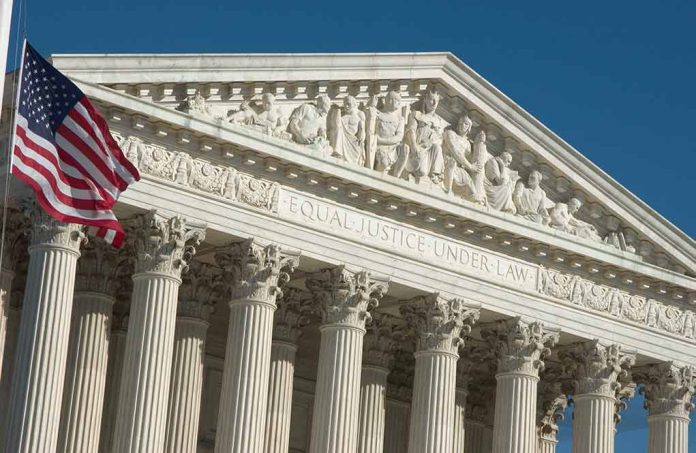
Arizona’s Supreme Court rejects ACLU’s plea to extend mail-in ballot correction deadline, upholding election integrity measures.
At a Glance
- Arizona Supreme Court denied emergency request to extend mail-in ballot correction deadline
- Court found no evidence of voter disenfranchisement
- All reporting counties confirmed proper voter notification procedures were followed
- Over 2.3 million mail-in ballots processed during the 2024 election
- Maricopa County continues counting approximately 200,000 remaining ballots
Court Upholds Election Integrity Measures
In a decisive move to maintain the integrity of Arizona’s electoral process, the state’s Supreme Court has rejected an emergency petition filed by the American Civil Liberties Union (ACLU) and other voter rights groups. The petition sought to extend the deadline for fixing issues with mail-in ballots, a process known as “curing.” This ruling comes as Maricopa County, the state’s most populous county, continues to process over 200,000 remaining ballots from the recent primary election.
The court’s decision reaffirms Arizona’s commitment to secure elections while ensuring that every legitimate vote is counted within the established legal framework. The ruling effectively maintains the state’s current election safeguards, which provide a reasonable timeframe for voters to address any issues with their mail-in ballots.
Arizona's Supreme Court rejected ACLU's request to extend the ballot curing deadline. Here's why. https://t.co/MxIU3EnYbN
— FOX 10 Phoenix (@FOX10Phoenix) November 11, 2024
No Evidence of Voter Disenfranchisement
The Arizona Supreme Court’s decision was based on a lack of evidence supporting claims of voter disenfranchisement. Justice Bill Montgomery, speaking for the court, stated, “No evidence of disenfranchisement before the Court.” This assessment came after a thorough review of the situation in Arizona’s counties.
“Thus, the Court is not presented with evidence that any voters will be prevented from curing a defective ballot by today’s 5:00 p.m. deadline. In short, there is no evidence of disenfranchisement before the Court.” – Arizona Supreme Court
All eight reporting counties confirmed that proper voter notification procedures were followed, ensuring that voters with inconsistent signatures were notified and given a chance to respond. This confirmation directly contradicts the ACLU’s argument that tens of thousands of Arizonans were at risk of disenfranchisement without proper notice.
ACLU's request to extend deadline for ballot curing rejected by Arizona Supreme Court https://t.co/YKa4Fgrasf
— Just the News (@JustTheNews) November 11, 2024
Reaction to the Court’s Decision
The court’s ruling was met with approval from Republican officials and representatives. Harmeet Dhillon, representing the Republican National Committee (RNC), expressed satisfaction with the outcome, stating, “ACLU lost its hail mary last minute lawsuit to extend the cure period for mail ballots lacking signature matches. Ballot curing is now over in Arizona. Let’s finish the tabulation and wrap this up.”
“Court ruled as predicted. ACLU lost. We won.” – Warren Petersen
Arizona State Senate President Warren Petersen echoed this sentiment, succinctly stating, “Court ruled as predicted. ACLU lost. We won.” These reactions underscore the significance of the court’s decision in maintaining the integrity of Arizona’s election process.
Ongoing Ballot Counting and Election Results
As of Sunday, over 67,000 early ballots remained unprocessed, with the majority coming from Maricopa County. The county had over 200,000 ballots left to count as of Sunday morning, highlighting the scale of the election operation in Arizona’s most populous region.
Despite the ongoing count, some preliminary results have emerged. The Associated Press has projected Donald Trump as the winner of Arizona’s Republican primary over Kamala Harris. In the closely watched Senate race, Democratic candidate Rep. Reuben Gallego was leading Republican candidate Kari Lake, though final results are still pending.
The Arizona Supreme Court’s decision to maintain the existing ballot curing deadline reinforces the state’s commitment to conducting fair and secure elections. By rejecting the ACLU’s emergency petition, the court has upheld the integrity of Arizona’s electoral process, ensuring that all legitimate votes are counted within the established legal framework.
Sources:
- Arizona Supreme Court declines ACLU’s request to extend ballot curing deadline
- ACLU asks Arizona Supreme Court to extend ‘curing’ deadline after vote-count delays
- Arizona Supreme Court Declines Emergency Request to Extend Mail Ballot Deadline














